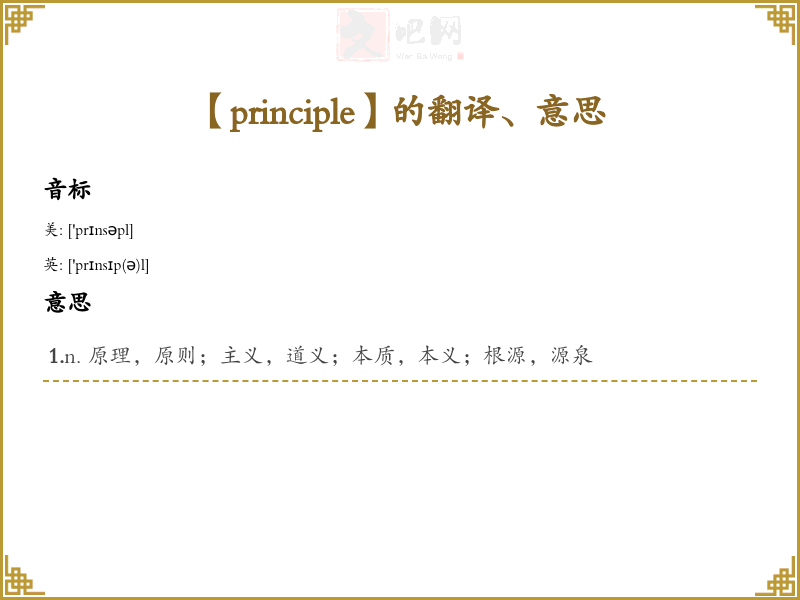【principle】的翻译、意思
时间: 2025-01-25 20:50:16
【principle】怎么读
美:['prɪnsəpl]
英:['prɪnsɪp(ə)l]
【principle】是什么意思、字义解释
1. n. 原理,原则;主义,道义;本质,本义;根源,源泉
【principle】的详细解释
英文单词学*与分析:[principle]
1. 基本定义
- 字面意思:该单词的字面含义是“原则”或“原理”,表示某种信念、信条或基本的真理。
- 词性:名词 (noun)
2. 词源与起源
-
词源分析:
- “principle”来自拉丁语“principium”,意为“开始、起点”。这个词由前缀“prince-”(表示“第一”或“开始”)和后缀“-iple”(表示“抓住或保持”)构成。
-
历史背景:
- “principle”在英语中的首次使用可追溯到14世纪,通常用于哲学和科学的讨论中。
-
课本:
- 在**的初中和高中英语教材中常出现。比如《人教版》英语教材。
- 在牛津英语和美国的高中阶段(如AP英语)教材中也频繁出现。
3. 使用场景
-
正式与非正式语境:
- 在正式场合,如学术论文、法律文件、商业报告中常用。例如:“The principle of fairness is essential in a just society.”(公平的原则在公正的社会中至关重要。)
- 在非正式场合,日常交流中也会使用,如朋友间的讨论。
-
特殊场合:
- 在科学领域,“principle”常常指科学定律或理论,例如:“The principle of gravity explains why objects fall.”(重力原理解释了物体为何下落。)
- 在法律领域,常用于指法律原则,如“the principle of justice” (正义原则)。
4. 示例句子
-
The principle of equality is fundamental in democratic societies.
(平等原则在民主社会中是基本的。) -
According to the principle of conservation, energy cannot be created or destroyed.
(根据守恒原理,能量不能被创造或销毁。) -
She believes in the principle of honesty above all else.
(她坚信诚实的原则高于一切。) -
The scientific method is based on the principle of observation and experimentation.
(科学方法基于观察和实验的原则。) -
Many ethical theories are grounded in the principle of maximizing overall happiness.
(许多伦理理论基于最大化整体幸福的原则。)
5. 同义词与反义词
-
同义词:
- Rule(规则):强调规定的性质,通常是较具体的。
- Law(法律):常用于科学或法律领域,指更为严格和普遍适用的原则。
-
反义词:
- Exception(例外):表示不适用的情况,与“原则”相对。
. 学方法教学
-
音标记忆法:/ˈprɪn.sə.pəl/
- 可通过反复朗读音标,帮助记忆发音和拼写。
-
词根记忆法:
- 了解“principle”来源于“prince”,可以联想成“第一的规则”,帮助记忆。
7. 关联词汇
- common principle(共同原则)
- ethical principle(伦理原则)
- fundamental principle(基本原则)
- guiding principle(指导原则)
- scientific principle(科学原则)
通过以上分析,可以更好地理解“principle”这个单词的含义、用法及相关知识。
【principle】例句
1、[N-VAR] A principle is a general belief about the way you should behave, which influences your behaviour. 原则
例:Buck never allowed himself to be bullied into doing anything that went against his principles.巴克从来不让自己被迫做任何违背自己原则的事。
例:It's not just a matter of principle.这不仅仅是个原则问题。
2、[N-COUNT] The principles of a particular theory or philosophy are its basic rules or laws. (理论或哲学) 原理
例:...a violation of the basic principles of Marxism.…对马克思主义基本原理的一种违背。
3、[N-COUNT] Scientific principles are general scientific laws which explain how something happens or works. (科学) 原理
例:These people lack all understanding of scientific principles.这些人缺乏对科学原理的全面理解。
4、[PHRASE] If you agree with something in principle, you agree in general terms to the idea of it, although you do not yet know the details or know if it will be possible. 原则上
例:I agree with it in principle but I doubt if it will happen in practice.我原则上是同意它的,但我怀疑在实践中它是否会发生。
5、[PHRASE] If something is possible in principle, there is no known reason why it should not happen, even though it has not happened before. 在理论上
例:Even assuming this to be in principle possible, it will not be achieved soon.即使假定这在理论上是可能的,它也不会很快就能实现。
6、[PHRASE] If you refuse to do something on principle, you refuse to do it because of a particular belief that you have. 依据原则
例:He would vote against it on principle.他会依据原则投票反对它。
